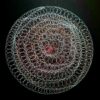
My Hands, The Machine’s Mind: Giving Up Artistic Agency
Kayla Block is a mixed media artist and creative technologist whose work lives at the intersection of memory, machine, and material.
“This project explores a human-AI art collaboration in which the artist relinquished creative agency to ChatGPT, following its instructions to create a mixed-media piece. Rather than functioning as a passive assistant, the AI was prompted to issue direct, uncompromising commands. The resulting work revealed both the strengths and limitations of a language model directing visual composition. While ChatGPT declared the piece complete, the artist perceived unresolved tensions. The project raises questions about authorship, aesthetic judgment, and the nature of creativity when one mind is human and the other computational, offering a reflective case study in co-creation across species of intelligence.”







